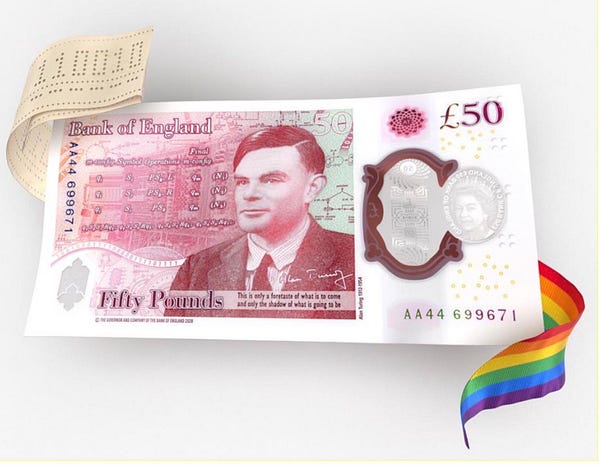Borkowski Weekly Media Trends 26-03-21
Alan Turing £50 Note | French Protests x The Art of Publicity | Jack Dorsey vs Congress | The Tories vs Cocaine Rd.2 (This time it's Culture Wars)
Revisionist approach undergoes stern Turing Test
The Bank of England have unveiled a new 50 pound note featuring Alan Turing. ‘I guess it’s a nice thing,’ said a friend of the Trends newsletter, a gay man whose equivocal response captures a larger worry within the queer community about the dangers of historical revision.
Long before he was a national treasure, Turing—a mathematician and code breaker who contributed his skills to the war effort during the Second World War—was convicted of gross indecency in 1952 and sentenced to imprisonment or probation dependent on chemical castration. He was convinced by his family to accept the latter.
Conversion therapy—such as that which led Alan Turing to suicide—remains legal in the UK. Many of the hard-won gains of gay men and lesbians are new and continue to feel fragile despite these tokens of recognition. (Adoption by same-sex couples, for example, was only just legalized only here in 2002.)
There is a hesitation on the part of the gay community about becoming the poster boys for the very national institutions that, until so recently, subjected them to torture. In a time when gay men and women are increasingly becoming poster boys for capitalism tout court, it’s easy to understand the worries over the new (literal) pink dollar.
A Good French Protest is Publicity Manifest
Befitting a nation founded on mass dissent, France has protest in its DNA. From the revolution(s) to May ’68, their protests are infamously frequent, visible and effective.
It should go without saying that there is nothing to be admired about this practice when it involves violence, and this has invalidated some of the initially powerful symbolism of the gilets jaunes movement. But, when peaceful, the French have turned protest publicity into a form of performance art.
The key to publicising activism is powerfully symbolic visual storytelling or, to strip away the comms-speak for a second, a cracking image or stunt that makes it obvious what the protest is about.
A stirring example this week was when French farmers arguing for higher prices for their produce drove tractors up to government buildings to dump manure on them.


It’s simple but potent; you know who they are, you know what they want, you understand their strength of feeling about it and you know who the enemy is: ‘We’re here, we’re French, we’re making quite a stench’.
Other examples in recent months include Greenpeace protestors painting an Air France plane green and Paris Opera ballerinas protesting pension reform with a street performance of Swan Lake.
Ballerinas protest outside Opéra Garnier. Picture: Twitter/Emmanuel Tixier
Both are ingenious in their scale, aesthetic sensibilities, symbolism and, above all, simplicity. This is what we’re demanding airlines do, this is what’s threatened by this new legislation. Done well and peacefully, a French protest is publicity in its purest form.
Jack Dorsey and the Revenge of the Rockstar Nerds
This week some of the biggest names in tech appeared before the House as lawmakers blasted tech giants on disinformation and extremism. Twitter founder Jack Dorsey stood out for his proverbial ‘f*ck you’ to the congressional committee. Feverishly tweeting during the hearing because he felt forced to answer complex questions with a simple yes or no, Dorsey mocked proceedings by tweeting a question mark “?” with a yes or no poll, which didn’t go unnoticed by his inquisitors.
Who would’ve thought our modern-day rock star rebels would be high-powered nerds with a smartphone?
He’s no Jagger, but the likes Dorsey and Elon Musk, high on their exclusive access to the futuristic world of NFTs etc, are always pushing the boundaries on what we consider cool. This week, Dorsey sold his first ever tweet for $2.9m – writing himself into NFT history before donating the money to charity.
So what’s next for the CEO-nerd-as-rockstar approach to comms? As we near peak NFT hype, the real question is which high-profile maverick is going to be the first to NFT themself, which would, to be fair, be pretty maverick.
Cocaine: Where do we draw the line?
What’s the worst thing you regularly do? Boris Johnson suspects that its casual cocaine use, and he wants stamp it out with a big PR campaign. The goal is to make people aware of the ravages of the cocaine trade and to make cocaine use as socially unacceptable as drink driving.
But why? Look at it through the lens of the culture wars, and the proposal makes sense. Some months ago we said the following about a similar proposal by Shaun Bailey:
“The Conservatives want to expose the hypocrisy of the middle-class Guardianista, who is happy to talk at rapid and stimulated speeds about their moral purity as they directly finance Mexican drug gangs.”
Bingo. According to the Times, the proposal has delighted police officers, who criticise the hypocrisy of middle-class drug users who act all high-and-mighty about environmental and social issues, but ignore the repercussions of using cannabis and cocaine. Though this policy might do some good, it’s hard to see it as something other than a cynical attempt to establish moral high ground in the war on woke. The lover’s quarrel continues.





